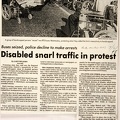The Cincinnati Enquirer
(This article continues on ADAPT 232 but the story is included here in its entirety for easier reading.)
Title: Disabled protesters spark Metro debate
BY PAUL FURIGA
The handicapped protesters who halted Queen City Metro buses have left jail and Hamilton County, but the controversy they created remains.
Leaders in the disabled community shied away from the demonstrations and arrests, but quietly applauded members of American Disabled for Accessible Public Transportation's (ADAPT) actions.
Almost two weeks ago Cincinnati police arrested 17 ADAPT members when they attempted to block the Vine Street entrance to the Westin Hotel and the Fourth Street entrance to Queen City Metro's offices. The demonstrators came from all over the United States to protest at the convention of the American Public Transit Association at the Westin.
Their protests raised hopes in Cincinnati.
A fire has started; and it's important to keep the flames fanned," said Basil Vlahopoulos, co-chairman of Metro‘s Specialized Transportation Advisory Committee (STAC). “if it dies, it will take another 10 years to get it started.”
Metro officials who run Access, the local transit service for the disabled, also find themselves in the public eye for the first time in several years.
“I think we" understand the need is there for more service,” said Judith Van Ginkel, spokeswoman for Metro. “The question is one of funding and do we have the funds available.”
“Every dollar is precious, and the issue is to put each dollar to best possible use,” said Murray C. Bond, Metro's assistant general manager.
Both camps agree that the ADAPT visit raised the public awareness of public transportation for the handicapped. Both also agree that a big debate on Access is in the future, the result of the ADAPT visit and recent changes in federal regulations.
Metro officials and handicapped leaders do not agree on the extent of problems with the current situation, or on the solutions that might improve transportation for the handicapped.
At Metro, Access manager Carl Palmer and Bond point out that each one-way Access trip costs taxpayers more than $10.
The annual cost for Access, Palmer said, is more than $1 million. For that money, he said Metro makes an estimated 105,000 one-way trips for passengers each year, charging them 60 cents each.
Palmer said Metro turns away only 4% to 5% of those who call to schedule Access service. But he acknowledges that Access meets only 6% of the estimated potential demand in Hamilton County.
A new federal interpretation of regulation 504, which mandates handicapped service, will require Metro to add about $200,000 to its Access service in 1987. That may allow service with two to three new vans, Palmer said.
But even that, he said, will not make much of a dent.
Bond says he sees few alternatives. As expensive as the Access service is, he argues that it would cost $6 million to equip Metro's 379-bus fleet with lifts that would accommodate handicapped passengers in lieu of Access.
- Created on
- Thursday 11 July 2013
- Posted on
- Wednesday 8 June 2016
- Tags
- 504, ADAPT - American Disabled for Accessible Public Transportation, APTA convention, arrested, buses with lifts, cost, local people with disabilities, paratransit, raised awareness, unmet need
- Albums
- Visits
- 1747
- Rating score
- no rate
- Rate this photo


0 comments